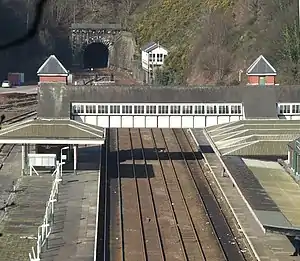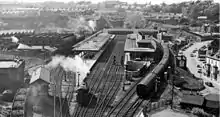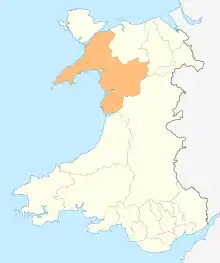Bangor railway station (Wales)
Bangor railway station is a railway station in Bangor, Gwynedd, operated by Transport for Wales. The station, which is 24 3⁄4 miles (40 km) east of Holyhead, is the last mainland station on the North Wales Coast line between Crewe and Holyhead. It is the busiest in terms of passenger numbers in North Wales,[1] as it serves the community around Caernarfon and further west, it is close to the Snowdonia National Park and Bangor University, and has an interchange with bus services to the various towns and villages of northern/western Gwynedd and Anglesey.
 Bangor railway station viewed from Bangor Mountain in 2005 | |
| Location | Bangor, Gwynedd Wales |
| Coordinates | 53.222°N 4.136°W |
| Grid reference | SH575716 |
| Owned by | Network Rail |
| Managed by | Transport for Wales |
| Platforms | 2 |
| Other information | |
| Station code | BNG |
| Classification | DfT category C1 |
| History | |
| Original company | Chester and Holyhead Railway |
| Pre-grouping | London and North Western Railway |
| Post-grouping | London, Midland and Scottish Railway |
| Key dates | |
| 1 May 1848 | Opened as Bangor |
| ? | Renamed Bangor (Caernarfonshire) |
| ? | Renamed Bangor (Gwynedd) |
| Passengers | |
| 2015/16 | |
| 2016/17 | |
| 2017/18 | |
| 2018/19 | |
| Interchange | |
| 2019/20 | |
| Interchange | |
| Notes | |
Passenger statistics from the Office of Rail and Road | |
History
The station, which cost £6,960 to build (about £21million in 2015), was opened on 1 May 1848 by the Chester and Holyhead Railway.[2] Lying between Bangor Tunnel to the east of the station, and Belmont Tunnel to the west, the station was progressively expanded into a junction station as a number of branch lines were opened:
- From Menai Bridge to Caernarvon (Bangor and Carnarvon Railway) (1848)
- From Gaerwen to Amlwch (Anglesey Central Railway) (1866)
- From Holland Arms to Red Wharf Bay and Benllech (Red Wharf Bay branch line) (1909)
- To Bethesda (Bethesda Branch) (1884)

The station was renamed twice under British Railways: originally Bangor, it became Bangor (Caerns); then Bangor (Gwynedd). In some timetables it was shown as Bangor for Beaumaris.[2]
The present building on platform 1 was the main building, with a forecourt on the site of the present car park. Between 1924 and 1927 an additional loop line and platform were constructed on the site of the forecourt with a new frontage facing Deiniol Road, which is still in use as the station booking office. Ultimately there were four platforms and a small bay platform to serve the main line and branch lines.[3][4]
By the 1950s there were an extensive goods yard, a five-road engine shed (on the site of the steel mill), a turntable, three-road goods shed, two signal boxes, an extra footbridge and a subway connecting platforms. There were a total of nine separate through routes from one tunnel to the other.
With the closure of the branch lines in the 1960s and 1970s, the station was reduced to just two operational platforms, with the track and platform on the pre-1920s forecourt converted back to something like its original use.
In November 2009 the Welsh Assembly Government asked Network Rail to conduct a feasibility study on reopening the line between Llangefni on Anglesey and Bangor for passenger services. Network Rail was asked to assess the track bed before publishing its report in 2010.[5] Work to clear away 21 years of vegetation began in April 2012.[6] It was confirmed by the Welsh Government in May 2017[7] that re-opening a station in Llangefni for passenger services using part of the mothballed Anglesey Central Railway line was under consideration, which would connect into the existing main line at Gaerwen.
Present day
The station presently uses two large island platforms, each served by loop lines which diverge from and rejoin the main lines in each direction. The main lines pass between the two operational platforms, and are used for passing empty stock movements, for terminated trains to lay-over awaiting their next working, and freight services, particularly the carriage of nuclear fuel flasks to and from Wylfa nuclear power station on Anglesey. At the western end of the station at the mouth of Belmont Tunnel, is a cross-over between the up main line and the down main line. Diverging from the down main line, also at the western end of the station, are four sidings; two adjacent to the most southerly platform island, and the other two enclosed within the nearby Network Rail engineering compound. Bangor signal box, which can be found at the western end of the up-direction platform, is lever-operated and controls the signals, points and user-worked level crossings as far as Abergwyngregyn to the east of Bangor, and Llanfairpwll to the west, including the single line crossing the Britannia Bridge between the Welsh mainland and Anglesey.
Facilities
The station is staffed 7 days a week (except Christmas Day and Boxing Day, when there are no train services) by both platform staff, who assist mobility-impaired passengers, dispatch the trains and provide travel advice, and booking office clerks. The platform building houses rail staff offices, passenger toilets and a waiting room, a café, and a British Transport Police station. Each platform is equipped with an electronic departure screen, and manual announcements are made over a public address system. There are three self-service ticket vending machines available for passengers to purchase or collect pre-paid tickets. Due to there being ticket purchasing facilities available 24 hours a day, passengers boarding trains here must purchase their tickets before boarding the train.[8]
There are storage racks for bicycles available on or near both platforms.
The whole station is fully accessible for those with mobility impairments.[9] The footbridge is accessed from both platforms by a staircase as well as a lift, as well as a third staircase from the station concourse area outside the booking office. The up-direction (Chester-bound) platform can also be accessed step-free via a ramp from the front car park, accessible off Station Road/Holyhead Road, and the down-direction (Holyhead-bound) platform is accessible step-free through the rear car park, located off Caernarfon Road. An accessible toilet is available on platform 1.
The station has two long stay car parks, to the front and rear of the station. 20 minutes of free parking is available in designated areas for the picking up or dropping off of passengers. The rear car park occupies part of the site of the former carriage sidings.
Free Wi-Fi is provided for waiting passengers on the platforms and the waiting room.[10]
Many local taxi firms operate from the taxi rank located to the rear of the ticket office building, adjacent to platform 1.
Transport for Wales have committed to investing £194 million on upgrades to stations over the first 5 years of their franchise contract. Bangor station can expect to have been fully re-branded with the installation of new digital information screens and CCTV by 2024.[11]
Services
There is a basic hourly service eastbound towards Wrexham General and Shrewsbury via Llandudno Junction, Colwyn Bay, Rhyl, Prestatyn, Flint and Chester, with alternate services extended to Birmingham International and Cardiff Central during the daytime, as well as westbound across Anglesey to Holyhead.
This hourly service is complemented by several through services to and from London Euston (six per day Monday-Friday to and from Holyhead, four on Saturdays, all of which run to/from Holyhead) operated by Avanti West Coast who also operate one service each way to/from Birmingham New Street via Crewe on weekdays. In addition there are several early morning & late night trains run by Transport for Wales running to/from Crewe and two trains to and from Manchester Piccadilly on weekdays, and one on Saturdays to/from Manchester Airport in the current (May to December 2019) timetable.[12]
Transport for Wales services towards Cardiff are usually operated by Class 175 diesel multiple unit trains, with the exception of the Premier Service which is operated by a rake of Mark 3 coaches hauled by a Class 67 diesel locomotive. Services towards Birmingham International are usually operated by Class 158 diesel multiple unit trains, allowing them to be coupled with services off the Cambrian Coast railway line upon arrival at Shrewsbury, to provide additional capacity between Shrewsbury and Birmingham. Another train formed of Mark 3 coaches hauled by a Class 67 locomotive also forms one of the weekday services to and from Manchester Piccadilly. All Avanti West Coast services are operated by Class 221 Super Voyager diesel-electric multiple unit trains.
On Sundays the service is hourly each way from mid-morning, but running mainly between Holyhead and Crewe, with select services extended to Cardiff Central, Birmingham International and Manchester Piccadilly. Avanti West Coast provide four up-direction trains to London Euston on a Sunday, and four down-direction services to Holyhead (three originating in London Euston, the fourth originating in Crewe).
The PlusBus scheme operates from this station, where for a small additional fee, an add-on bus ticket can be purchased alongside a rail ticket allowing journeys to be made using the services of most of the major bus operators in and around the wider area. This allows easy access by public transport to Ysbyty Gwynedd as well as many of the popular local attractions, such as Bangor Pier, Penrhyn Castle, Aber Falls and Zip World in Penrhyn Quarry, Bethesda, all of which are inside the Bangor PlusBus area.[13] Easy interchange with all local bus services is possible, with many services departing from the bus stops a very short walk away on Holyhead Road.
| Preceding station | Following station | |||
|---|---|---|---|---|
| Llanfairfechan | Transport for Wales North Wales Coast Line |
Llanfairpwll | ||
| Llandudno Junction | Transport for Wales Premier Service |
Holyhead | ||
| Avanti West Coast London and the West Midlands to North Wales |
||||
| Historical railways | ||||
| Terminus | London and North Western Railway Bethesda branch line |
Felin Hen Halt Line and station closed | ||
Future services
By December 2022, Transport for Wales plans to start & terminate its direct services to and from Manchester Airport via Manchester Piccadilly at Bangor.[14] This will be in addition to the current service level, and will be made possible when the new hourly Llandudno-Liverpool Lime Street via the Halton Curve services commence. All Transport for Wales services serving Bangor by this time are expected to be operated by new CAF Civity diesel multiple-unit trains,[15] except the Holyhead-Cardiff Premier Service which is expected to be operated by refurbished Mark IV coaches inherited from LNER, hauled by Class 67 locomotives.[16]
Notes
- "Station Usage Statistics 2012/13". Office of Rail Regulation. Retrieved 11 March 2014.
- Butt, R.V.J. (1995). The Directory of Railway Stations. Yeovil: Patrick Stephens Ltd. p. 26. ISBN 1-85260-508-1. R508.
- John Cowell (1990). Bangor: A Portrait in Old Picture Postcards. S.B. Publications. ISBN 1-870708-58-X.
- John Cowell (1997). Bangor: A Pictorial History (Volume 2). ISBN 0-9518592-3-4.
- "Old tracks could see trains again". BBC News. 6 November 2009. Retrieved 26 April 2010.
- "Initial work begins on Llangefni-Amlwch railway". North Wales Chronicle. 20 April 2012. Archived from the original on 4 March 2016. Retrieved 12 May 2015.
- Wyn-Williams, Gareth (6 May 2017). "'Ghost railway' could re-open for first time in 50 years". northwales. Retrieved 17 May 2017.
- "TfW Revenue Enforcement Policy" (PDF). Transport for Wales Rail Services. 16 February 2019.
- "National Rail Enquiries -". www.nationalrail.co.uk. Retrieved 15 October 2016.
- Apr 24, The Bangor Aye |; News | 0 |, 2018 | Bangor (24 April 2018). "WiFi Plans approved for Bangor Station". The Bangor Aye. Retrieved 16 February 2019.
- "TfW Customer Report" (PDF). Transport for Wales Rail Services. Retrieved 16 February 2019.
- Table 81 National Rail timetable, May 2019
- "Bangor PLUSBUS (north Wales)". PLUSBUS. Retrieved 17 May 2017.
- "What's Happening in North Wales | Transport for Wales". tfw.gov.wales. Retrieved 16 February 2019.
- Hughes, Owen (31 August 2018). "These new trains will serve North Wales rail routes under new franchise". northwales. Retrieved 16 February 2019.
- "What's Happening in the Borders | Transport for Wales". tfw.gov.wales. Retrieved 16 February 2019.
Further reading
- Mitchell, Vic; Smith, Keith (2010). Bangor to Portmadoc. West Sussex: Middleton Press. figs. 1-7. ISBN 9781906008727. OCLC 548582976.
- Mitchell, Vic; Smith, Keith (2011). Bangor to Holyhead. West Sussex: Middleton Press. figs. 1-11. ISBN 9781908174017. OCLC 795179106.
- Mitchell, Vic; Smith, Keith (2012). Rhyl to Bangor. West Sussex: Middleton Press. figs. 98-109. ISBN 9781908174154. OCLC 859594415.
External links
| Wikimedia Commons has media related to Bangor (Gwynedd) railway station. |
- Train times and station information for Bangor railway station (Wales) from National Rail
- Postcard of Bangor railway station in 1909
